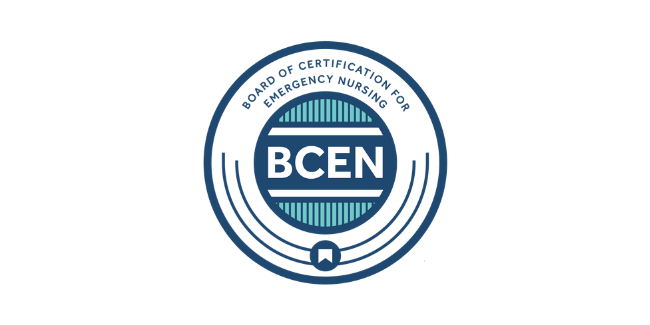On Sept. 10, BCEN was pleased to announce our 2020 National Certification Champion Award winners, including our Small Healthcare Organization category winner:
 Childress Regional Medical Center
Childress Regional Medical Center
Childress, TX
For our Meet the Winner Q&A with Childress Regional Medical Center (CRMC), Nurse Educator Rayna Knox, MSN, RN, CEN, who nominated CRMC for the award, was joined by CRMC CEO Kevin Latimer, CNO SuLynn Mester, MSN, RN, and Trauma Program Manager/Emergency Department Nurse Manager Kate Schaefer, RN, CEN, NREMT.
What does the BCEN National Certification Champion Award mean to Childress Regional Medical Center?
Rayna: CRMC has a mission to be the best rural hospital in the state of Texas. Being recognized on a national level for our efforts, encouraging and providing opportunities for our staff members to grow professionally and clinically means we are another step closer to achieving our mission. We value quality care, and to be recognized for our dedication through the efforts of our staff to provide optimal, competent, and quality care means we can stand behind our mission. As a BCEN National Certification Champion Award winner, we are proud to show our community members, our patients, and other rural facility peers across the nation that we are committed to upholding and growing professionals for our patients’ health outcomes.
Why are you glad you have so many certified emergency nurses on staff as you deliver care during the coronavirus pandemic?
SuLynn: The COVID-19 pandemic has brought an immense amount of stress to the healthcare world. When working in a rural facility, 150 miles from the next tertiary hospital, you find that you and your staff are all you have. To have nurses who are dedicated to their practice, to the highest standard of care, and to being the best advocate for the patient and facility, you find value in knowing you have champion leaders throughout the unit.
As everyone knows and feels, we have been working through unprecedented times. The treatments and protocols are changing faster than we can push them out. In the beginning, we pushed changes out two or three times a day, just like everybody across the nation. Because we are in a rural and isolated geographic island, two hours away from a higher level of care in any direction, it is even more important for nurses to be educated with cutting-edge pandemic knowledge.
BCEN-certified nurses raise care to a higher level, both from a knowledge and an advocacy standpoint. We find that these champion nurses have the experience and competence to aid in providing collaborative care and shared ideas. Navigating COVID-19 has been a team effort. In the midst of the unknown, it is comforting to know our certified nurses are there to offer their knowledge and remain dedicated to educating themselves around the constant updates, changes, and best practices in regard to COVID-19.
What continues to surprise you about the impact of BCEN certification?
Kate: It has been really eye-opening to see how BCEN certification has created leadership in our emergency department. Our certified nurses are looked up to, both by their peers and our medical staff. They are the go-to champions in our department. Certification and certified nurses have created a higher level of quality in our department. That higher quality and that striving for excellence has transformed our patient care and teamwork.
As a region, or at least in Texas, few rural hospitals have certified nurses. When one of our nurses went for it, the others followed suit, and they are constantly building each other up. We have gone from an environment where the nurses are here for their shifts to an environment where they truly are wanting to be the best ER in the Panhandle.
It has been amazing to see the level of leadership and quality that certification has brought our department up to. The ER certified nurses, their leadership and the way that they take care of patients, and their pride in the care they give, has conveyed to other departments and has encouraged those nurses to get certified in their specialties.
Our nurses are constantly saying: “That was on my CEN exam” or “When I was studying for my CEN, I learned about this.” And they have really started to understand how to apply evidence-based practice in the emergency department. We would not be at the clinical level we are, and the level of confidence, without a big goal to strive towards such as certification.
SuLynn: For some of our nurses, obtaining their CEN was a stepping-stone in their career paths and confidence building. Some have become leaders among their peers. Some, such as Kate Schaefer, our ED nurse manager and trauma coordinator, accepted additional leadership positions in the region and state influencing regional and state policy. Some returned to the academic classroom. The impact BCEN certification has had on our staff has propelled them to reach for the stars.
Making the most out of every budget dollar is essential, particularly for a rural hospital. What ROIs make supporting specialty certification for your emergency nurses a smart choice?
Kevin: Because we aim to be the best rural hospital in Texas, we know we have to employ the best people in Texas. In any hospital, your greatest asset is your employees. The more you invest in them, the better they feel—not just about themselves, but also about taking care of patients.
When we did our annual recognition banquet for our certified nurses, what I thought was kind of shocking was the tenure, the longevity of our certified nurses. Our turnover rate by itself is low, but our turnover rate of our certified nurses is even lower. So, from an ROI standpoint, an employee that stays longer is not only better from a turnover rate standpoint and a training and education standpoint, but they are better from an outcomes standpoint.
We have an annual $800 allowance we offer to every single employee that they can use to continue their education. Every one of our certified nurses have used that to help with getting and maintaining their certification. One of the things that we also do is when RNs get certified, we give them a 2% pay bump. The more that we can do to encourage our nurses to become better educated, the more they become better employees, we have better outcomes, and our turnover rate is lower. One of the really cool things about our rural hospital is our average employee has been here over nine years. I would put that up against any rural hospital in Texas.
SuLynn: Simply put, when people feel valued, they often give you their best efforts. We are not unaware of the disparities that face our employees because we live in a rural community. With less opportunities and resources for professional growth due to our geographical location, we know that to invest in our employees and provide them opportunities will assist in driving their job satisfaction, their delivery of care, and ultimately the outcome of care. The ROI is clearly seen in decreased turnover rate among those with certification and overall positive patient outcomes.
What do you most want organizations that are on the fence about supporting certification to know?
SuLynn: If I am speaking to administrative personnel, I would definitely point out the ROIs, because certification changed things for us as far as longevity and turnover. Speaking on a nursing level, I think about the improved patient outcomes and the pride the nurses have in themselves. BCEN certification allows them to carry themselves in a different light, to feel stronger about advocating for patients. When your knowledge base increases, you obviously feel much more confident in speaking up, speaking out and advocating.
Rayna: If an organization wants the quality care and the competency in their bedside staff, it has to start from the top. When you have leaders like SuLynn who are dedicated to being the best, it filters down. The work of our board and our administrative team and SuLynn as our CNO has pushed the nurses, and she feeds it into us all the time.
SuLynn: It does start from the top. Our board has never batted an eye at spending educational dollars. We do not push them for unreasonable means, but they never question the need or the value. As a result, we have very, very robust educational programs. We have a full tuition reimbursement program and in addition to that, we have the $800-a-year professional development allowance, and we do not limit how they can use it. We also bring speakers into our facility because of our geographical isolation. You have to support the mission you are trying to achieve, and you have to lead the cause from the top down. I feel that CRMC has done that so well from a board level and from an administrative level. Education is huge in our facility on any level.
Kevin: The truth about being a rural hospital is that anybody in the United States on any given day can be a patient in our emergency room. There are two busy highways that go through Childress, Texas, and over the past five years, we’ve had at least one patient from 48 of the 50 states.
When someone needs us, we do not want to be just a rural hospital, we want to be the highest level of care that that patient can possibly get. If we need to save their lives, we want to be able to do that. That comes with having the right employees. That comes with having the right equipment. That comes with having employees that truly are the best. Rayna talked about being the best ER in the Panhandle. I do not even think she said rural ER in the Panhandle. But that is their attitude and that is our attitude. On any given day, a patient can be from Dallas or California or even from Hawaii. What we are hoping to do is be able to take care of every one of them and save their life.
Read our Meet the Winner Q&As with Large Healthcare Organization category winner UVM Health Network – Champlain Valley Physicians Hospital and Healthcare System category winner Life Link III.
In case you missed it, you can read the Sept. 10 announcement of all the 2020 BCEN National Certification Champion Award winners here.

